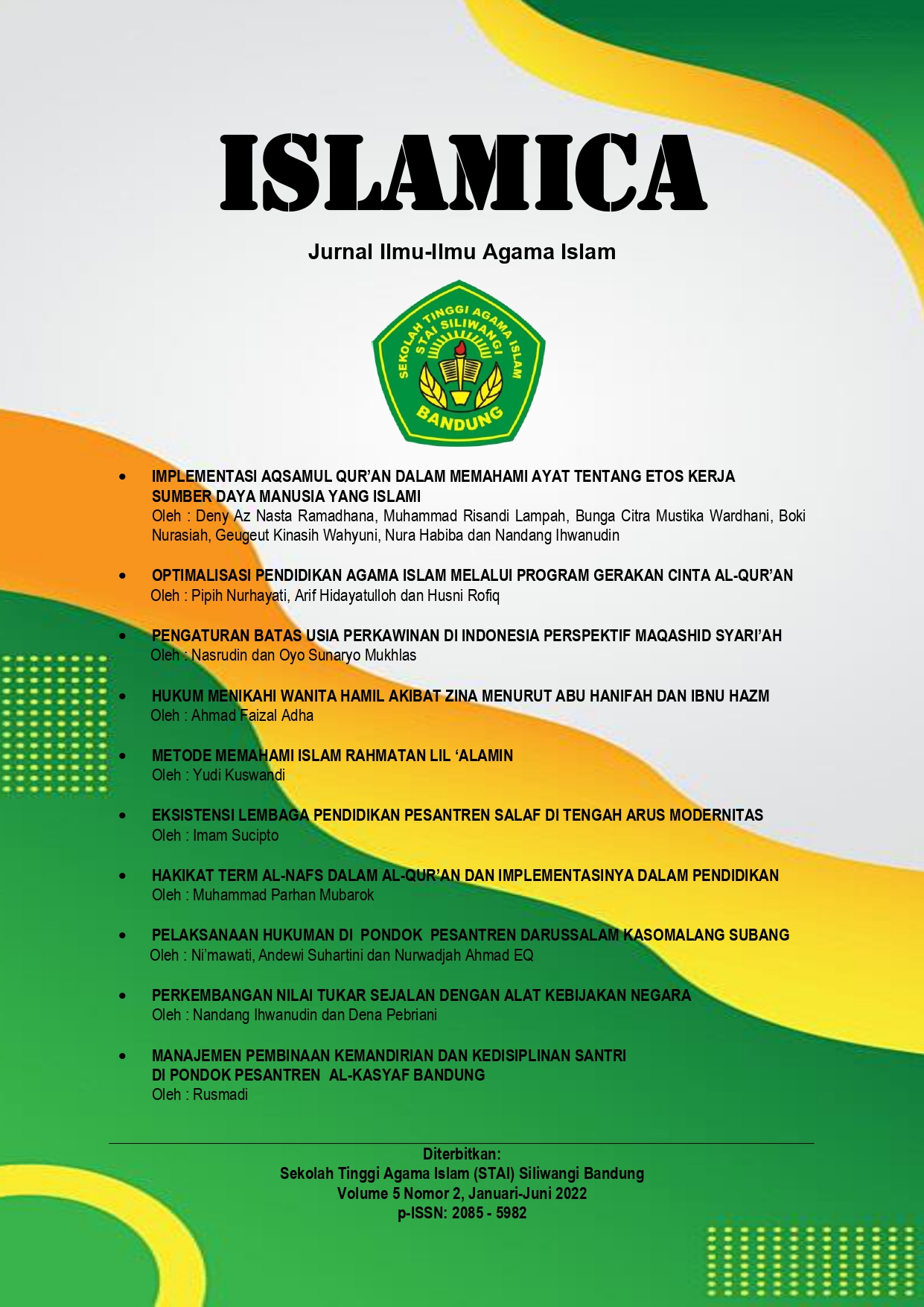Hakikat Term Al-Nafs Dalam Al-Qur’an Dan Implementasinya Dalam Pendidikan
DOI:
https://doi.org/10.59908/islamica.v5i2.27Abstrak
Al-Nafs is a word that is often found in the Qur'an in various letters and verses. This call from Allah SWT implies that it is essential to analyze the human self (anfus) because it relates to the concept of the man himself. It indicates that the human person or nafs is significant to discuss and analyze. It is mainly associated in terms of education and educational activities. The purpose of this study was to determine (a) the Definition, Role and Function of Al-Nafs, (c) the Concept of Al-Nafs in the Al-Quran, (d) the Implementation of Al-Nafs in Education. This study uses descriptive-analytical methods by providing a systematic, factual, and accurate description of the facts relating to the understanding, role, and function of al-Nafs—the concept of al-Nafs in the Al-Quran the implementation of al-Nafs in education. The data collection techniques in this research are literature studies of sources related to the subject matter mentioned above.
The results of this study are that as a soul, students must have etiquette and duties (which can also be called student traits). To form a student or student with noble character and knowledge, the existence of methods and approaches in Islamic Education is very instrumental. Furthermore, the method, facilities, infrastructure, and financing are also very supportive and helpful in the continuity of a student's learning process and the goals of education itself. The conclusion from the results of this study is that the concept of Al-Nafs in the Qur'an is a sign from Allah SWT about how the tasks and functions of humans themselves and if it is related to its implementation with education is how teachers and students are essential elements in learning. It makes education occupies a central position in the learning process.
Referensi
Ahmad Warson Munawir, al-Munawir Kamus Arab Indonesia, Pustaka Progressif, Yogyakarta, 1984.
Ibnu Manzur Muhammad Ibnu Mukarram al-Anshari, Lisan al-Arab, Juz VIII, Dar al-Misriyah li al-Ta’lif wa al-Tarjamah, Kairo, 1968.
Lewis Makluf, al-Munjid fi al-Lughah wa A’lam, Daar al-Masyriq, Beirut, 1986.
M. Solihin, Penyucian Jiwa dalam perspektif Tasawuf Al-Ghazali, Pustaka setia, Bandung : 2000.
M. Solihin, Penyucian Jiwa dalam perspektif Tasawuf Al-Ghazali (Bandung : Pustaka setia, 2000),45
Muhammad Fuad Abd al-Baqi, Mu’jam al-Mufahrash li Iifadli al-Qur’an al-Karim, Dar al- Fikr, Beirut: 1994.
M. Quraish Shihab, Wawasan Al-Qur’an: Tafsir Maudhu’i atas Pelbagai Persoalan Umat, Mizan Bandung, 1996,
Moh. Rokib, Ilmu Pendidikan Islam, Lkis, Yogyakarta: 2009 Cet Ke-1.
Robert Frager, Hati, Diri dan Jiwa Psikologi Sufi untuk Transformasi, Serambi, Jakarta: 2005. Ramayulis, Ilmu Pendidikan Islam, Kalam Mulia, Jakarta: 2010 Cet. Ke-8.
, Metodologi Pendidikan Agama Islam (Jakarta: Kalam Mulia, 2008) Cet ke-5, h. 63
Sukanto Mm dan A Dardiri Hasyim, Nafsiologi Refleksi Analisis tentang Diri dan Tingkah Laku Manusia, Surabaya, Risalah Gusti.
Unduhan
Diterbitkan
Cara Mengutip
Terbitan
Bagian
Lisensi
Hak Cipta (c) 2022 Muhammad Parhan Mubarok

Artikel ini berlisensiCreative Commons Attribution-ShareAlike 4.0 International License.

















